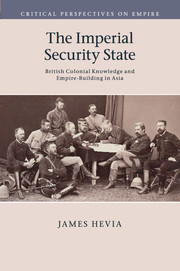Crossref Citations
This Book has been
cited by the following publications. This list is generated based on data provided by Crossref.
HARPER, TIM
2013.
Singapore, 1915, and the Birth of the Asian Underground.
Modern Asian Studies,
Vol. 47,
Issue. 6,
p.
1782.
Hale, Matthew
Raymond, Graham
and
Wright, Catherine
2013.
List of publications on the economic and social history ofGreatBritain andIreland published in 2012.
The Economic History Review,
Vol. 66,
Issue. 4,
p.
1134.
Vogel, Jakob
2013.
Von Käfern, Märkten und Menschen.
p.
261.
Bajc, Vida
2013.
Sociological Reflections on Security Through Surveillance.
Sociological Forum,
Vol. 28,
Issue. 3,
p.
615.
Morrison, Alexander
2014.
Camels and Colonial Armies: The Logistics of Warfare in Central Asia in the Early 19th Century.
Journal of the Economic and Social History of the Orient,
Vol. 57,
Issue. 4,
p.
443.
Westaway, Jonathan
2014.
That undisclosed world: Eric Shipton'sMountains of Tartary(1950).
Studies in Travel Writing,
Vol. 18,
Issue. 4,
p.
357.
Bayly, Martin J.
2015.
Imperial ontological (in)security: ‘Buffer states’, International Relations and the case of Anglo-Afghan relations, 1808–1878.
European Journal of International Relations,
Vol. 21,
Issue. 4,
p.
816.
Barkawi, Tarak
2015.
Legacies of Empire.
p.
27.
Hevia, James
2015.
Policing America's Empire: The United States, the Philippines, and the Rise of the Surveillance State. By Alfred W. McCoy. Madison: University of Wisconsin Press, 2009. 695 pp. $29.95 (paper)..
The Journal of Asian Studies,
Vol. 74,
Issue. 3,
p.
789.
Beattie, Hugh
2015.
Hostages on the Indo-Afghan Border in the Later Nineteenth Century.
The Journal of Imperial and Commonwealth History,
Vol. 43,
Issue. 4,
p.
557.
Barkawi, Tarak
2016.
Decolonising war.
European Journal of International Security,
Vol. 1,
Issue. 2,
p.
199.
Das, Runa
2017.
He Named Me Malala: connecting the historical, the local, and the global.
Social Identities,
Vol. 23,
Issue. 2,
p.
195.
Manchanda, Nivi
2017.
Rendering Afghanistan legible: Borders, frontiers and the ‘state’ of Afghanistan.
Politics,
Vol. 37,
Issue. 4,
p.
386.
MORRISON, ALEXANDER
2017.
Beyond the ‘Great Game’: The Russian origins of the second Anglo–Afghan War.
Modern Asian Studies,
Vol. 51,
Issue. 3,
p.
686.
MacArthur-Seal, Daniel-Joseph
2017.
Intoxication and Imperialism.
Comparative Studies of South Asia, Africa and the Middle East,
Vol. 37,
Issue. 2,
p.
299.
Po, Ronald C.
2018.
The Blue Frontier.
Malkin, Stanislav Gennadyevich
2018.
Methodological features of asymmetric conflicts historical modeling studying.
Samara Journal of Science,
Vol. 7,
Issue. 2,
p.
215.
Day, Jenny Huangfu
2018.
Qing Travelers to the Far West.
Lhost, Elizabeth
2018.
Writing Law at the Edge of Empire: Evidence from the Qazis of Bharuch (1799–1864).
Itinerario,
Vol. 42,
Issue. 2,
p.
256.
2019.
Insurgent Aesthetics.
p.
76.



